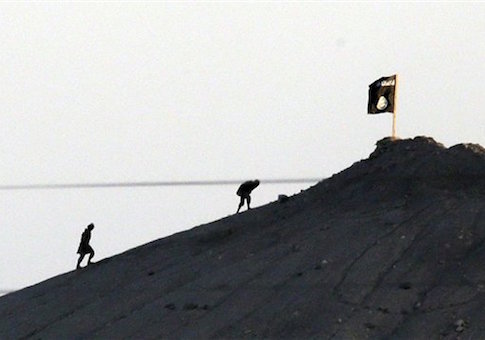JERUSALEM—Israeli lookouts on the Golan Heights are scanning the Syrian landscape for the black flag of the Islamic State after three small jihadi groups close to the border this week pledged fealty to the radical group.
The jihadist militias are among a number of rebel groups, both Islamist and secular, fighting the Damascus regime of Bashar al-Assad in the area opposite the Golan Heights. During the three years of the Syrian civil war, none of the groups in this loose coalition has attacked Israeli border positions, focusing instead on their battles with regime forces. These skirmishes, sometimes only a few hundred yards from the border, are easily visible from Israeli positions on high ground.
According to Arab media, the three local jihadist groups, viewing Islamic State as a rising power, have announced their allegiance to its leader, Abu Bakr al-Baghdadi. The largest of the factions, Shuhada al-Yarmouk, has several hundred men in its ranks. The other two, the Abu Mohammed al-Tilawi Brigade and Bayt al-Maqdis, number a few dozen men each. The three are concentrated around the southern Syrian town of Daraa, a few dozen miles from the Golan. Some of their outposts, however, are only a few miles from the border. Daraa is where the rebellion against Assad began three years ago.
Syrian forces have been steadily driven back from the area closest to Israel in recent months and rebel groups now hold some 90 percent of the border region.
Israel has developed a positive relationship with the moderate militias in its proximity. Wounded Syrian personnel, both fighters and civilians, are treated on the border in field facilities set up for this purpose by the Israeli Army medical corps. Scores of persons with more serious wounds are taken inland to be treated at Israeli hospitals. Israel has reportedly also provided blankets, food, and clothing for villagers who are cut off by the fighting.
However, Israeli army commanders are alert to the possibility that this co-existence may give way in the near future because of the rising popularity of the Islamic State and its increasing battlefield successes.
This is what happened in Sinai when the largest jihadi militia fighting Egyptian security forces declared its loyalty two years ago to al Qaeda. Last month it announced that it was now loyal to the Islamic State. The group has launched rockets into Israel and even staged a cross-border raid that killed eight Israelis but it has devoted the bulk of its efforts to fighting the Cairo regime.
The Syrian army, which lost two army bases to the Islamic State in the past week, has shrunk from 315,000 soldiers since the civil war began in 2011 to roughly 150,000 soldiers, according to the Institute for the Study of War. An Institute analyst, Christopher Kozak, told the International Business Times that the situation was "a dynamic stalemate" in which neither the regime nor the rebels are in a position to defeat the other side.
"The regime cannot defeat the rebels," he said, "and the rebels have not been able to decisively defeat the regime."
